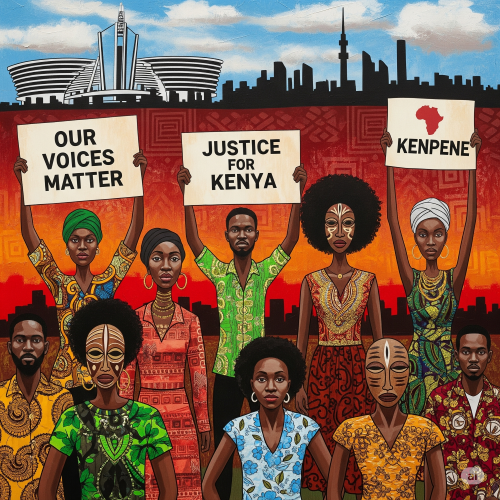Why Kenya's #ProgressYouCanFeel Hashtag Should Inspire Us All

In recent weeks, Kenyan Twitter has been charged with one phrase: #ProgressYouCanFeel. It’s not just a clever turn of phrase. It’s a serious challenge to the idea that development is something to be measured only in policy documents or budget briefs. Kenyans are making it clear that if there is progress, it should be something they can actually feel—in their homes, on their roads, at the market, and in their pockets.
The trend has captured national attention not because it’s viral, but because it’s true. People are tired of being told they’re doing better when their rent is overdue, their wages are stagnant, and their basic needs are slipping further out of reach. They want a different kind of progress. Not the theoretical kind, but the kind that shows up in real life.
Source: X.com
Old Wounds That Still Bleed

Image Credit: Al Jazeera
If there’s one thing Kenyans have learned over the years, it’s that violence is often the state’s response to dissent. The Kianjokoma brothers’ deaths in 2021, allegedly at the hands of police, triggered widespread outrage. Promises of accountability followed, but results were elusive.
That same pattern returned this year. The death of blogger Albert Ojwang in police custody was a breaking point. His death revived public anger over police brutality and sparked a wave of protests across the country. In the weeks that followed, Amnesty International reported that more than 10 people were killed, with dozens more injured. For many, it felt like a familiar script, citizens punished for speaking up, and silence from those in power.
The real tragedy, some say, isn’t just the violence. It’s the normalization of it. That’s why people are demanding not just justice, but change in the way the state engages with its citizens.
The Economy Isn’t Letting Up Either
Alongside these long-standing human rights issues is an economic crisis that feels just as suffocating. Many Kenyans say they are working harder for less. The cost of living has spiked. Essentials like food, fuel, and electricity are eating deeper into household budgets.
The flashpoint came in the form of the Finance Bill 2024, which proposed new taxes on everyday items, from bread to diapers. Public backlash was immediate and overwhelming. Thousands took to the streets. Parliament was stormed. At least 20 people died in that confrontation, and the bill was eventually withdrawn. But the trust was already broken.
People saw it as yet another example of a government out of touch with the realities of ordinary life.
Social Insight
Navigate the Rhythms of African Communities
Bold Conversations. Real Impact. True Narratives.
A New Kind of Protest, A New Kind of Protestor
What stood out this time wasn’t just the scale of the protests—it was the people leading them. These were young, digitally native Kenyans, most of them from Generation Z. No political banners. No familiar party slogans. Just citizens organizing on social media and demanding to be heard.
This wasn’t politics as usual. It was something far more powerful. A decentralized, cross-class, cross-ethnic movement that wanted accountability, not from one party or another, but from the entire system.
These are young people who have grown up watching corruption unfold in high places, while being told to wait for their turn. Now, they’re saying they won’t wait anymore.
Why #ProgressYouCanFeel Should Inspire the Continent
What’s happening in Kenya matters far beyond its borders. The hashtag #ProgressYouCanFeel speaks directly to frustrations that are deeply familiar across Africa. Citizens in many countries are routinely told their economies are growing, that reforms are working, that development is underway. But too often, those gains exist only in speeches and spreadsheets.
Across the continent, people are asking the same question: if things are improving, why does it still feel this hard to live?
The Kenyan example offers a simple but powerful benchmark—if you can’t feel the progress, it’s probably not real. A new road is not progress if the hospital is still broken. A rising GDP is not progress if a parent can’t afford school fees. Digital dashboards and televised updates mean little if the public is still queuing for water.
Kenya’s youth have drawn a line, and it’s one the rest of Africa should pay attention to. They are not anti-government. They are not asking for miracles. They are asking for truth, equity, and a fair shot at a better life. That shouldn’t be revolutionary. But in many places, it still is.
From Tags to Hope
#ProgressYouCanFeel isn’t just a catchy phrase. It’s a test. It challenges leaders to show proof, not just plans. It demands outcomes, not optics. It asks whether governance is improving lives in ways that people can actually experience.
This is not about anger alone. It’s about hope that hasn’t yet been extinguished. It’s about people who still believe change is possible, and are willing to fight for it in the streets and online, until it arrives.
If progress is real, it must be felt. It must be visible. And it must belong to the people—not just to those who write the reports, but to those who live with the results.
Recommended Articles
Saudi League Slams Ronaldo: 'You Are Not Bigger Than The League' Amid Al-Nassr Strike
)
Cristiano Ronaldo protested the Saudi Pro League's transfer dealings, citing perceived financial bias against Al-Nassr, ...
New in: Lagos Police Clamp Down on Protesters; Activists Cry 'War on Poor'

A protest against forced evictions in Lagos led to the arrest of activist Taiwo Hassan "Soweto" and Dele Frank. While po...
Billie Eilish Ignites Controversy: Calls ICE a 'Terrorist Group' After Minneapolis Shooting

Pop star Billie Eilish has publicly condemned the United States Immigration and Customs Enforcement (ICE) following a fa...
Zambia Erupts: Bill No. 7 Sparks Protests and Government Dismisses 'Fake' MP List!

Key figures, including Mr. Kasonde, were arrested during protests against Zambia's Bill 7, despite possessing a permit, ...
You may also like...
Bundesliga's New Nigerian Star Shines: Ogundu's Explosive Augsburg Debut!

Nigerian players experienced a weekend of mixed results in the German Bundesliga's 23rd match day. Uchenna Ogundu enjoye...
Capello Unleashes Juventus' Secret Weapon Against Osimhen in UCL Showdown!

Juventus faces an uphill battle against Galatasaray in the UEFA Champions League Round of 16 second leg, needing to over...
Berlinale Shocker: 'Yellow Letters' Takes Golden Bear, 'AnyMart' Director Debuts!

The Berlin Film Festival honored
Shocking Trend: Sudan's 'Lion Cubs' – Child Soldiers Going Viral on TikTok

A joint investigation reveals that child soldiers, dubbed 'lion cubs,' have become viral sensations on TikTok and other ...
Gregory Maqoma's 'Genesis': A Powerful Artistic Call for Healing in South Africa

Gregory Maqoma's new dance-opera, "Genesis: The Beginning and End of Time," has premiered in Cape Town, offering a capti...
Massive Rivian 2026.03 Update Boosts R1 Performance and Utility!

Rivian's latest software update, 2026.03, brings substantial enhancements to its R1S SUV and R1T pickup, broadening perf...
Bitcoin's Dire 29% Drop: VanEck Signals Seller Exhaustion Amid Market Carnage!

Bitcoin has suffered a sharp 29% price drop, but a VanEck report suggests seller exhaustion and a potential market botto...
Crypto Titans Shake-Up: Ripple & Deutsche Bank Partner, XRP Dips, CZ's UAE Bitcoin Mining Role Revealed!

Deutsche Bank is set to adopt Ripple's technology for faster, cheaper cross-border payments, marking a significant insti...
